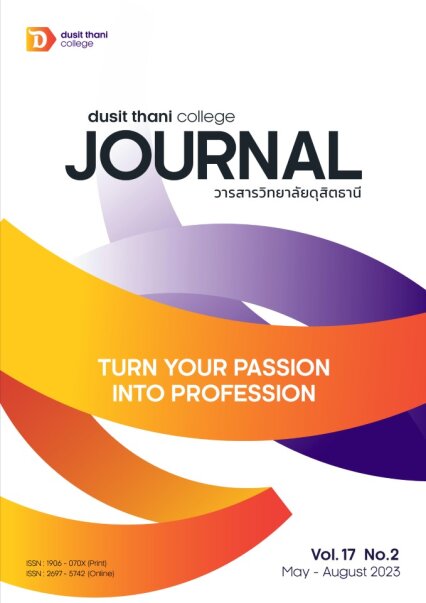The Factors of Service Innovation Affecting on Innovation Effectiveness and Organizational Performance of the Hotel Business in Prachuap Khiri Khan District
Main Article Content
Abstract
The purpose of this research was to study the influence between service innovation factors affecting innovation effectiveness and organizational performance of the hotel business in Prachuap Khiri Khan Province. Data collection used questionnaires as a study tool, the sampling group used in the quantitative research was a survey of entrepreneurs and senior executive of hotels in the area of Prachuap Khiri Khan Province with a total of 281 people using the sampling method of proportional stratified random and purposive sampling. The Statistics used in data analysis were frequency, percentage, mean, standard deviation; and correlation coefficient statistics, also used simple regression analysis and multiple regression.The results showed that 1) service innovation had a positive influence on innovation effectiveness 2) service innovation had a positive influence on the hotel business’s organizational performance, and 3) innovation effectiveness had a positive influence on the hotel business’s organizational performance. The coefficients of influence were 0.650, 0.492 and 0.270, respectively. The analysis of service innovation variables found that knowledge management capability had the highest average (x ̅ = 3.97, SD = 0.43); the analysis of innovation effectiveness variables found that the developing new business models has the highest average level of opinions (x ̅= 3.65, SD = 0.71); the analysis of the hotel business’s organizational performance found that customer satisfaction to the creation of innovation or new business models occurred had the highest average opinion level (x ̅= 4.04, SD = 0.48). Therefore, organizations should pay attention to developing and creating innovations in ways that are appropriate to the context, which it should emphasize on creative management to create value and benefit the success of the organization in the long run.
Article Details

This work is licensed under a Creative Commons Attribution-NonCommercial-NoDerivatives 4.0 International License.
Article Screening Policy
- All research and academic articles to be published must be considered and screened by three peer reviews in the relevant field / article.
- All articles, texts, illustrations and tables published in the journal are the personal opinions of the authors. Editors don't always have to agree. And no responsibility whatsoever is the sole responsibility of the author.
- The articles to be published must never be published. Where did you first publish? And not in the consideration of other journals If the audit found that there has been a duplicate publication It is the sole responsibility of the author.
- Any article that the reader sees as being plagiarized or impersonated without reference. Or mislead the work of the author Please let the journal editor know it will be your greatest blessing.
References
Baron, R. M., and Kenny, D. A. (1986). Baron & Kenny, 1986. Journal of Personality and Social Psychology, Vol. 51, pp. 1173-82.
Bitner, M.J., Brown, S.W., and Meuter, M.L. (2000), "Technology infusion in service encounters", Journal of the Academy of Marketing Science, Vol. 28 No.1, pp.138-49.
Bean, R. and Radford, R. (2002). The Business of Innovation. New York: Amacom.
Boes, K., Buhalis, D., and Inversini, A. (2015). Smart tourism destinations: Enabling factors and challenges. In Information and Communication Technologies in Tourism 2015 (pp. 377-389). Springer.
Bouarfa, H. 2008. Designing a Virtual Memory – A Case Study. International Workshop on Advanced Information Systems for Enterprises, Constantine, Algeria.
Chalip. L., and O’ Brien. (2008). Sport Events Strategic Leveraging: Pushing Towards the Triple Bottom Line. Martin, D., & Woodside A.,. (red.) Tourism Management: analysis, behavior and strategy Wallingford, UK Cambridge, MA: CAB1 Pub.
Dalkir, K. (2013). Knowledge management in theory and practice. Routledge.
De Clercq, D., Dimov, D., and Thongpapanl. N. (2010). The Moderating Impact of Internal Social Exchange Processes on the Entrepreneurial Orientation-Performance Relationship. Journal of Business Venturing. 25(1), 87-103.
Fox, K.A. (2001), "Invisible competition: some lessons learned", Journal of Business Strategy, pp.36-8.
Hult, Tomas., Hurley, Robert., and Knigst, Gary. A. (2004). “Innovativeness: Its Antecedents and Impact on Business Performance.” Industrial Marketing Management 33, 5:429-438.
Krejcie, R. V. and Morgan, D. W. (1970). Determining Sample Size for Research Activities. Educational and Psychological Measurement, 30(3), pp. 607-610.
Mendoza, A., and Sheffrin, S. (2017). Innovation in service firms: Technological and non-technological innovation differences. Technological Forecasting and Social Change, 116, 244-251.
National Innovation Agency. (2016). Innovation . can be accessed from http://www.nia.or.th/spring/index.php? page=faq [2022, March 12].
Rauch, A., Wiklund, J., Lumpkin, G., and Frese, M. (2009). “Entrepreneurial Orientation and Business Performance: An Assessment of Past Research and Suggestions for the Future.” Entrepreneurship Theory and Practice 33, 3: 761–787.


